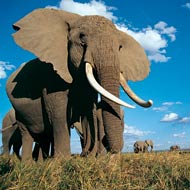
Five African countries agree to suspend ivory trade
The commitments agreed by heads of state and ministers at an illegal wildlife trade conference, has been praised by an international charity.
Foreign Secretary William Hague announced the launch of an Elephant Protection Initiative (EPI) with the Governments of Ethiopia, Chad, Botswana, Tanzania and Gabon, at the conference last week.
The EPI includes an agreement to suspend all future international ivory trade for a minimum of 10 years and after until African elephant populations are no longer threatened. Those countries signing also agreed to put all ivory stockpiles beyond economic use.
The five governments will encourage other African elephant range states to sign up as well.
Meanwhile the “Stop Ivory” group announced $2 million of support for the EPI, and the UK Government agreed to match this amount.
Other illegally traded species, including rhino, tiger, lion and Africa's great apes, should also benefit. The conference saw nations agreed to enforcement measures and strategies to reduce demand for products such as rhino horn.
It was further announced that no products from threatened species will be used in official Government functions (For example, shark fin is banned from Government functions in China).
Political leaders recognised the detrimental economic, social and environmental consequences that illegal wildlife trade inflicts on many of the poorest countries across the globe, as well as the role of corruption and money-laundering in facilitating wildlife trafficking.
Will Travers, president of the Born Free Foundation, said: “As many as 50,000 elephants were slaughtered last year and I am heartened by this news and the renewed government commitments to tackling the wildlife poaching crisis.
"The decisions in London give me, and all who care about our natural world, hope. At last, the measures necessary to address wildlife law enforcement, demand elimination, and improved security are forthcoming.
"Destruction of ivory stockpiles is a vital step toward combating the illicit trade in ivory and I praise the Governments of Ethiopia and Chad for their commitment to destroy their ivory and put this bloody wildlife contraband out of circulation once and for all.
"The commitment to refuse consideration of resuming legal ivory trade is highly significant – particularly for Botswana and Tanzania, which have long been advocates of ivory trade. Born Free warmly welcomes this change of approach, one that is consistent with the international mood and severity of the situation and congratulates Botswana and Tanzania for taking this courageous step.
“I warmly congratulate William Hague, the UK government and the Royal Foundation for playing a leadership role and assisting wildlife trade to be recognised as a serious international crime.
“Finally, the tide is turning. If serious funding commitments follow this meeting , then we might be witnessing a dramatic turnaround in fortune for elephants, rhinos and all the other species that for too long have suffered at the hands of human greed.”
For more on the Born Free Foundation click here.



 The Greyhound Board of Great Britain has published new vaccination guidance, with all greyhounds registered from 1 January, 2027 required to have the L4 leptospirosis vaccination, rather than L2.
The Greyhound Board of Great Britain has published new vaccination guidance, with all greyhounds registered from 1 January, 2027 required to have the L4 leptospirosis vaccination, rather than L2.